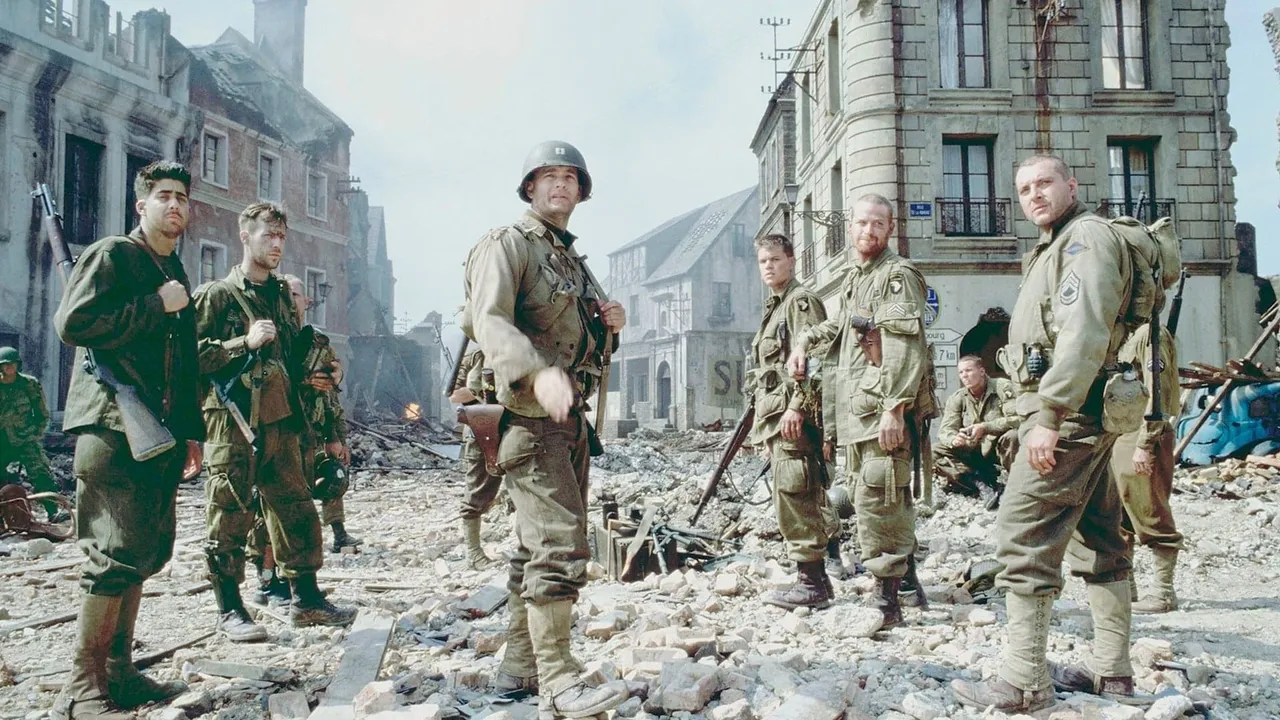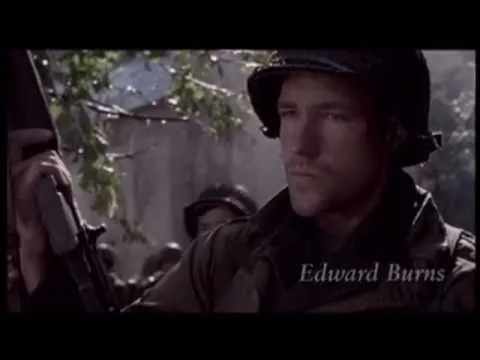
In late 1990s most Americans (and, thanks to Hollywood, most of the people in industrialised countries) had rather distorted perception of the war as social and historical phenomenon. That was especially true for younger generations, unfamiliar with bitter experiences of two world wars, Korea and Vietnam. For them the only point of reference to war were images of laser-guided bombs hitting distant and blurred targets with surgical precision or columns of terrified men waving white flags in the desert. In Clinton's years wars were fought or were supposed to be fought briefly, cheaply, painlessly and bloodlessly. Those wars – especially military interventions ending the wars in Bosnia and Kosovo - were as PG-13 as majority of Hollywood films. This explains why any high-profile film dealing with phenomenon of war in marginally more realistic manner was earth-shattering shock. Steven Spielberg started this trend with his 1998 war drama Saving Private Ryan.
The plot of the film is set during the war which is often referenced as the last "good" war - WW2. The film begins with the battle which wasn't the most decisive, but definitely was the most spectacular and most remembered in American's collective psyche. On June 6th 1944 British, American, Canadian and other Allied armies landed on the beaches of Normandy and thus began the liberation of Europe from Nazis. Like in all such endeavours in history, things weren't always going smoothly for the attackers. American V Corps experienced that in the worst possible way on the section of the coast code-named "Omaha". Bad weather, undetected minefields and surprisingly spirited and effective defence by German 352nd Division conspired to turn the landing into bloody fiasco. Only small section of the beach was taken, most of the equipment was lost and new waves of soldiers were clogging the tiny piece of beach only to be mercilessly mowed down by German machine guns, mortars and artillery. After couple of hours, American forces, supported by Allied naval and air bombing, managed to break out of their tiny beachhead. In the grand scheme of things, events on the Omaha Beach were nothing more than bump in the road - tiny tactical setback in what turned out to be huge strategic success - but the horrendous number of casualties suffered that day become the symbol of the terrible price USA had to pay for its victory in WW2.
After brief prologue with unnamed US WW2 veteran (played by Harrison Young) visiting graves of his fallen comrades in present-day Normandy, the film starts with landings on Omaha Beach. Captain John Miller (played by Tom Hanks) of US Army Rangers is just one of many officers who would have most of his men killed that day. After the landing Miller gathers the remains of his unit and leads the successful charge towards German bunkers. At the end of the day it turns out that among thousands of American soldiers lost that day is Sean Ryan, whose two brothers also died at the same day. When General Marshall (played by Herve Pressnell) learns of this, he is worried that the devastating loss of Mrs. Ryan could have profound effect on American morale. He decides that the only remaining brother must be brought from the front lines. Unfortunately, Private James Ryan (played by Matt Damon) of 101st Airborne Division is among thousands of paratroopers chaotically roaming the Normandy's interior - no man's land between counter-attacking German forces and Allies trying to establish continuous front line. Miller and seven and his men are ordered to go there and bring Ryan to safety of Allied beachhead.
Critics, especially those in USA, almost immediately called Saving Private Ryan the best war film of all times. The explanations ranged from "emotionally most compelling" to "most realistic" and "groundbreaking in its depiction of war". Such reactions are easy to explain with the film's opening scene that depicts the landing at Omaha Beach. The scene lasts for about 20 minutes and indeed represents something which was rarely seen in Hollywood films – brutally realistic and uncompromising portrayal of war. Equipped with army of extras, special effects and, last but not least, his huge talent, Spielberg shows all the horror of the modern battle, starting with anxious soldiers unaware that they are going to experience something beyond their worst nightmares. Instead of heroic combat audience sees horrific slaughter of helpless men, being torn to pieces by distant, faceless enemy. Spielberg shows in most graphic detail the ways in which human body could be hurt by modern weaponry - people drown, get burned beyond recognition, get disembowelled, lose their limbs or simply lie in absolute agony. But the most terrifying thing about death in battle is its absolute randomness - soldiers die whether they are good or bad; intelligent or stupid; religious or atheist; brave or cowardly; well-trained or inexperienced; being well-armed and well-equipped or not. The war is a violent event, and its violence is irrational and, as such, can never be completely chained by the rational concepts of planning, drill and orders. First twenty minutes of Saving Private Ryan capture those unpleasant and disturbing truths about war perfectly. If an "Oscar" could be given for first twenty minutes of film, Saving Private Ryan would deserve golden statue not for a year, but for a decade.
Unfortunately, Saving Private Ryan is much longer than twenty minutes. Intense, harrowing and hyperrealistic opening is followed by disappointing two and half hours of movie. The story about group of soldiers risking their lives in order to save a single life is burdened with too much pathos, sentimentality and cliches borrowed from classic Hollywood films about WW2. Even the music score by John Williams, one of the most important ingredients of Spielberg's magic formula, is hardly memorable. The acting, on the other hand, is very good. Tom Hanks is very believable in the role of a capable and efficient officer who gradually starts to feel emotional aftermath of the war. Tom Sizemore is also effective as his trusted sergeant. Jeremy Davies, Adam Goldberg, Vin Diesel, Edward Burns, Barry Pepper and Giovanni Ribisi are also good, although at times they can't overcome the obvious ethnic cliches of their respective roles. In the last segment of Saving Private Ryan, when the protagonists had to fight a pitched battle with counter-attacking Germans, the story is getting a little bit better. During it Spielberg shows ability to portray combat in realistic, exciting manner without confusing the audience.
Outside USA and especially in past few years, Saving Private Ryan became the object of intense criticism, at times as intense as the praises received after the premiere. Some, especially those more familiar with complicated and sad history of WW2, accuse film of perpetuating the American chauvinist myth about US forces being the only reason why Hitler didn't win. This criticism is partially justified. All Allied soldiers that appear in film are Americans; French are shown as pathetic cowards while British are barely mentioned, and in negative context. What was the effort of many nations is reduced to exclusively American affair. Spielberg also got a little bit creative with history - a mistake that won't be repeated in A Band of Brothers, excellent mini-series inspired by this movie.
"Anti-war" credentials of the film, based on Spielberg's interviews, were also put in question. Spielberg stance towards war as a social phenomenon, as presented in Saving Private Ryan, is indeed far from pacifism. Following the bloody opening, which is the most "anti-war" segment of the film, Saving Private Ryan uses many opportunities to show that World War 2 was just and noble crusade rather than pointless waste of American lives; the audience is reminded of Nazi evilness and that the crushing of Hitler's empire required not only blood, sweat and tears but also some morally questionable actions that could look repugnant to squeamish and self righteous audiences at the end of 20th Century. At the end film almost explicitly states that the Clinton's prosperous, hedonist, carefree America owes its unprecedented freedom and wealth to those who made the ultimate sacrifice sixty years ago. It implicitly argues that similar sacrifices could be made in the future. Sadly, the events in past few years showed that Spielberg might not be wrong in justifying war. The foundations of modern liberal democratic civilisation are much weaker than the people in 1990s liked to believe. The world is much darker, complicated and scarier place and democratic societies can't survive without at least symbolic willingness to resort to violent, unpleasant forms of defence, including wars. And wars in our times, unlike Hollywood films, are going to be R-rated.
RATING: 7/10 (+++)
(Note: The text in its original form was posted in Usenet newsgroup rec.arts.films.reviews on April 12th 2004)
Blog in Croatian https://draxblog.com
Blog in English https://draxreview.wordpress.com/
Cent profile https://beta.cent.co/@drax
Minds profile https://www.minds.com/drax_rp_nc
Uptrennd profile https://www.uptrennd.com/user/MTYzNA
Brave browser: https://brave.com/dra011
BTC donations: 1EWxiMiP6iiG9rger3NuUSd6HByaxQWafG
ETH donations: 0xB305F144323b99e6f8b1d66f5D7DE78B498C32A7

